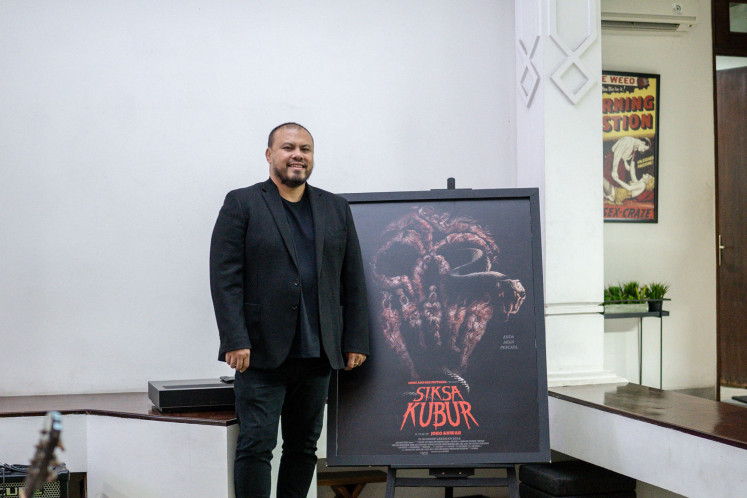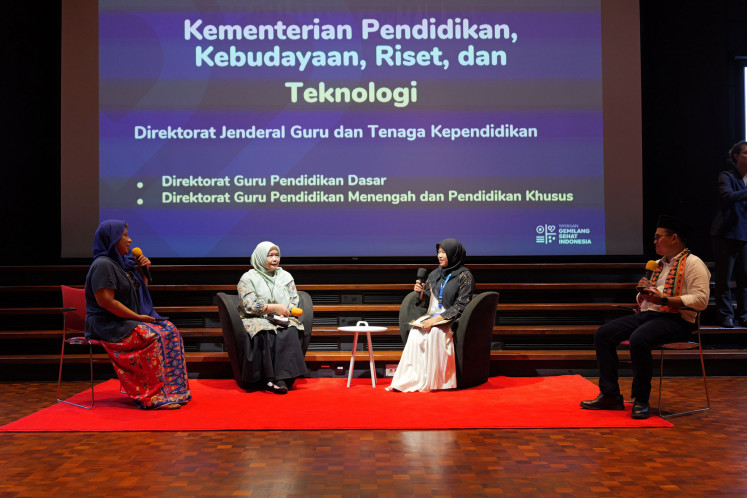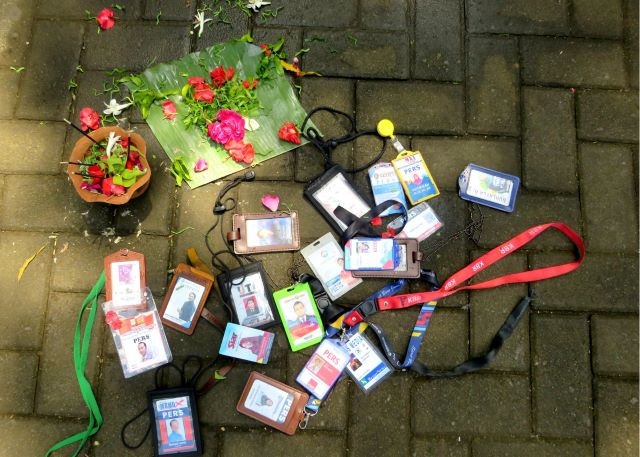Joko Anwar's Leap of Faith
The Indonesian auteur has crafted himself a rich and remarkable filmography. His latest project, Siksa Kubur (Grave Torture), is a prayer of questions and restlessness.
Change Size
 (Courtesy of JP/Muhammad Zaenuddin)
(Courtesy of JP/Muhammad Zaenuddin)
A full-circle moment.
Perhaps no expression could better illustrate the conversation between Joko Anwar and me, which took place on April 5 at his office in North Cipete, South Jakarta. After all, approximately two decades ago, Joko was seated almost exactly in my position. As a film-focused contributor to The Jakarta Post at the time, the then-20-something Joko managed to secure an interview with another Indonesian filmmaker, Nia Dinata, to discuss the latter's theatrical directorial debut, the 2002 historical drama Ca-bau-kan (The Courtesan).
Little did Joko know at the time that their conversation would change the course of his life forever.
It is a moment that Joko still cherishes tenderly. Now that the positions are switched, the 48-year-old auteur acknowledged that he would still prefer being the one delivering the questions.
"I'm an introverted person, actually," Joko said, bashfully.
Did Joko ever miss being a journalist?
"To be honest, I don't miss it at all!" he answered with a rapturous laugh. "I know how exhausting being a journalist can be. For the ones who are in charge of the daily news desk, in particular, they would usually have to go out to the field around 7 a.m. to cover the news as soon as possible — only to finally return to the office, write the articles and submit to the editors by around 6 p.m. Heck of a pressure, being a journalist."
Paths to one destination
In a way, Joko Anwar's encounter with Nia Dinata back in the day could be interpreted by outsiders as a divine intervention from the higher power to help Joko manifest what had been his dream all along: being a filmmaker. Nia was impressed by Joko's exuberance so much that she helped him land a job as the assistant director for the 2003 Sekar Ayu Asmara-directed drama Biola Tak Berdawai (The Stringless Violin) and, on top of that, hired him as her co-writer for the 2003 satire Arisan! (The Gathering!)
Still, looking back, Joko did not see their encounter as either a happenstance or a saving grace. In a different universe, he believes, one way or another, a filmmaker would still have been his calling.
"All the paths that I chose were intended for the same destination, which was being a filmmaker," Joko said. "I attended the Bandung Institute of Technology because I wanted to join the campus' Student Film League. I graduated as soon as possible because I wanted to apply for a job at film production houses. When it didn't pan out, I decided to become a film journalist because I wanted to meet the filmmakers in Indonesia. I also became a film critic because I wanted to get to know them and vice versa. Ultimately, I didn't know what I wanted to be if not a filmmaker."
Biola Tak Berdamai and Arisan! might be the flicks that gave Joko a foot in the door, but it was his 2009 psychological thriller, Pintu Terlarang (The Forbidden Door), that later solidified his status as the breakthrough talent to watch in Asian cinema. On one hand, the film did not exactly generate the same box-office prowess as Joko's previous outings ("The film got the harshest reviews from domestic critics when it first came out," Joko recalled, wryly).
But on the other, not only did Pintu Terlarang manage to draw rave reviews from the international market, but it also hinted at Joko's future as a distinguished, psychological thriller auteur with a penchant for a warped delineation — something that would be mirrored in his later films such as 2017’s Pengabdi Setan (Satan’s Slaves) and this year's Siksa Kubur.
"I never want to make a film that provides a conclusive ending," Joko explained, summarizing the red thread that connects his filmography thus far. "For me, making a 'conclusive' film would be the same as betraying life itself – because life is a continuum."
Furthermore, a nonconclusive, unexpected ending has the power to reveal the audience's emotional investment in Joko's characters.
"It's not a typical open ending per se," he added. "Instead, it's an ending that depends on your take on the character's journey."
Read also: The Great Nastar Debacle'None of my films are sacred'
Filmmaking is already a road laden with precariousness and unpredictability. Making films that both reflect and challenge their audience's perceptions, meanwhile, makes for an even more arduous terrain. Despite Joko's steeped devotion to his craft, he refuses to put any of his films on a pedestal.
"None of my films are sacred," he quipped. "I don't take my work – or myself – too seriously. I mean, I do everything seriously, but I don't take them seriously. Everyone is free to criticize or dissect my films in whatever they wish."
The modern cinephiles might perceive Joko as simply one of the most prolific Indonesian filmmakers. However, it took, understatedly speaking, more than a few leaps of faith to get where he is today. The ticket sales of Modus Anomali (Ritual – 2012) and A Copy of My Mind (2016) for example, were not as gargantuan as his other flicks. Nonetheless, in retrospect, they later managed to help introduce art house cinema to the mainstream conscience.
Some of Joko's leaps of faith, meanwhile, have had a bittersweet note to them. It is still fresh in my memory when Joko's Pengabdi Setan, one of the most commercially successful Indonesian films of all time and one of the rare gems of high-quality fright flicks out there, lost out to the specialty pic Night Bus for best picture trophy at the 2017 Festival Film Indonesia.
Joko, ultimately, decided to look at award recognition, earned or snubbed, like water off a duck's back.
"Never do I feel either disappointed or overly celebratory when my film wins or loses an award," he said. "[For instance] they say Pintu Terlarang is amazing, but I don't think it nabbed any award nomination. I don't know. Do you have the record of whether it got any nomination or not? Because I don't even remember."

'Most accomplished film'
Only time can answer whether Joko Anwar's latest leap of faith, Siksa Kubur, will generate a big splash in both ticket sales and the award circuit. One thing for sure is that, as in his previous projects, Joko is keen on demonstrating his growth and maturity as a storyteller – this time, by putting religion as the narrative focal point.
In terms of casting alone, Siksa Kubur stands in a different, more elevated league. The religious horror flick gathers revered thespians such as Reza Rahadian, Slamet Rahardjo Djarot, Arswendy Beningswara, Niniek L. Karim, Jajang C. Noer, Djenar Maesa Ayu, Happy Salma and Christine Hakim as well as rising stars such as Putri Ayudya, Muzakki Ramdhan, Widuri Puteri and Faradina Mufti. Siksa Kubur premiered in Indonesian theaters on April 11.
Joko and I deliberately avoided discussing the plot of Siksa Kubur during our conversation -- in the hope that the audiences would be able to enjoy the film in theaters without preconceived notions. Nevertheless, thanks to the internet, the prospective audiences might have already been aware of the film's premise. After losing their parents due to religious terrorism, a pair of adult siblings (played by Faradina Mufti and Reza Rahadian) decided to prove that there is no such thing as grave torture (siksa kubur) for dead sinners, further proving that religion is nothing but illusory.
Does Joko believe that Siksa Kubur trumps his most critically acclaimed work, the 2019 folk-horror Perempuan Tanah Jahanam (Impetigore)?
"By far!" He answered with no hesitation. "I think this is my most accomplished film yet. And I'm happy that many of my friends think the same."
Being his 10th directorial feature film, Joko also noted that Siksa Kubur was his most challenging film yet. Let's just say that fusing religion with jump-scares in a riveting fashion was simply a single item on Joko's long list of tasks.
"From the story perspective – and also the way I tell the story itself – I wanted to challenge myself and the audience," he elaborated. "It would be okay for me should the audience end up scoffing and be like, 'What the heck is this?' But, at the very least, once I was given the privilege to make a film, I would not stick in one place only because that would have been such a waste. As a filmmaker, we have to push the boundaries."
At this point in his career, Joko has grown more than prepared in anticipating the sort of conversation that his latest pic may elicit. He acknowledged that the belief in 'siksa kubur' is a difficult subject to discuss. For this reason alone, perhaps for the first time in his career, Joko's leap of faith will depend on his audience's faith as well.
Read also: The ever-evolving identity of Indonesia’s streetwear scene'Will you believe this?'
To drive his message home, he also inserted an "interactive" element into the film, though he underlined that such was not a "promotional [explicit]".
"At one point, the film is really asking you a question: Will you believe this? If so, then you'll have your ending. But, if you refuse to believe, then you'll have a different ending," he teased. "With Siksa Kubur, you get to choose your own ending."
The "layered" nebulosity of Siksa Kubur might also serve as the reason why Joko decided to assemble such a high-wattage cast in the first place. As if the stakes were not high enough already, Siksa Kubur marks the first theatrical pic where Come and See Pictures, a film production house that Joko himself founded, served as lead producer.
"That shows how special this film is. As the film's director and writer, this one is very personal. And when I told everyone involved about it, they also thought the same," he asserted. "As Muslims, even before we attend elementary school, we would learn how to recite the Koran and we would be taught about 'siksa kubur'. Do you know what it feels like to listen to stories about 'siksa kubur' as a child? It's very traumatic."
In a certain way, Siksa Kubur could be interpreted as Joko's ode to the weary child in him: "It's the voice of our inner child asking a question. In actuality, I'm the type of person who harbors an immense restlessness as well as everybody else. How come we normalize so many things now – such as corruption?"
When all is said and done, Siksa Kubur might end up dividing opinions, but there is a good chance that it will linger beyond the end credits. If the film can be seen as more than just another Friday night pastime, that would be a job well done.
"This is not the kind of story that will make audiences be like, 'Okay, so sweet!' or 'Oh, so scary!'" he quipped. "Judging from the reactions during the gala premiere, the film still lingered in the minds of some of the audience [after the screening]. Even now, some of them reach out to me and ask, 'Can I call you? I have some questions!'"
And maybe, with Siksa Kubur as their conduit, both Joko and his audience can answer those questions together.
Read also: Five questions for modest fashion influencer Mega Iskanti
This article is part of The Weekender, which comes out on the Saturday edition of The Jakarta Post. It offers a variety of lifestyle and culture articles aimed at enriching your reading experience. Subscribe here to get access to the Saturday edition and all other premium content from the Post.









